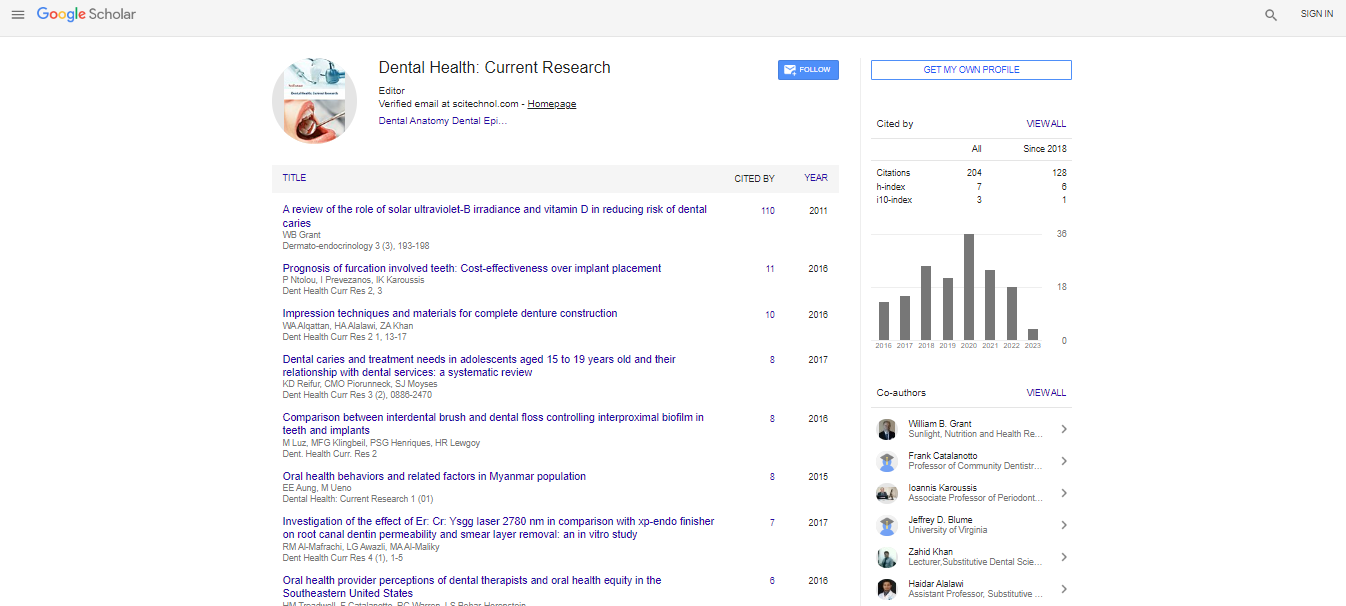Opinion Article, Dent Health Curr Res Vol: 10 Issue: 1
Guardians or Invaders? The Role of Microorganisms in Oral Health
Rafeil Oliviar*
1Department of Biosciences and Oral Diagnosis, Institute of Science and Technology, São Paulo State University, São José dos Campos, Brazil
*Corresponding Author: Rafeil Oliviar
Department of Biosciences and Oral
Diagnosis, Institute of Science and Technology, São Paulo State University, São
José dos Campos, Brazil
E-mail: oliviarar@gamil.com
Received date: 29 January, 2024, Manuscript No. DHCR-24-130291;
Editor assigned date: 31 January, 2024, PreQC No. DHCR-24-130291 (PQ);
Reviewed date: 14 February, 2024, QC No. DHCR-24-130291;
Revised date: 21 February, 2024, Manuscript No. DHCR-24-130291 (R);
Published date: 28 February, 2024 DOI: 10.4172/2470-0886.1000196.
Citation: Oliviar R (2024) Guardians or Invaders? The Role of Microorganisms in Oral Health. Dent Health Curr Res 10:1.
Description
The oral cavity is a bustling ecosystem teeming with a diverse array of microorganisms, including bacteria, fungi, viruses, and archaea. While these microscopic inhabitants may evoke images of disease and decay, they play a complex and nuanced role in maintaining oral health. In this article, we explore the delicate balance between the beneficial and pathogenic microorganisms within the oral cavity and their impact on overall oral health.
The oral microbiome refers to the community of microorganisms that inhabit the oral cavity. This ecosystem is incredibly diverse, with hundreds of species coexisting in a complex interplay of competition, cooperation, and adaptation. Among these microorganisms, bacteria are the most abundant and widely studied, with over 700 species identified in the mouth.
Guardians of oral health
Many of the microorganisms residing in the oral cavity act as guardians of oral health, performing essential functions that contribute to the maintenance of a balanced and healthy environment. Beneficial bacteria compete with pathogenic microorganisms for resources and space, limiting their growth and preventing the colonization of harmful pathogens. Certain oral bacteria contribute to the maintenance of tissue homeostasis by modulating immune responses, promoting tissue repair, and regulating inflammation. Some oral bacteria play a role in the initial stages of digestion by breaking down carbohydrates and producing enzymes that aid in nutrient absorption. Beneficial bacteria produce acids that help to maintain the acidity of the oral environment, preventing the growth of acid-loving bacteria responsible for dental decay.
Invaders: Pathogenic microorganisms
While many microorganisms in the oral cavity contribute to oral health, certain species can become opportunistic pathogens under favorable conditions, leading to the development of oral diseases such as dental caries (cavities), periodontal disease (gum disease), and oral infections. Factors such as poor oral hygiene, dietary habits, smoking, and systemic health conditions can disrupt the balance of the oral microbiome, allowing pathogenic microorganisms to flourish and cause disease. The key to oral health lies in maintaining a balanced and diverse oral microbiome. Strategies to promote microbial balance and oral health include. Brushing twice daily, flossing regularly, and using antimicrobial mouthwashes can help remove plaque and reduce the risk of dental disease. Consuming a balanced diet rich in fruits, vegetables, and whole grains while limiting sugary and acidic foods can help support a healthy oral microbiome. Routine dental examinations and cleanings can help detect early signs of dental disease and prevent its progression.
Conclusion
The microorganisms inhabiting the oral cavity are not simply invaders to be eradicated but rather essential inhabitants that contribute to oral health in numerous ways. By understanding the delicate balance between beneficial and pathogenic microorganisms and adopting strategies to promote microbial harmony, we can support oral health and overall well-being. Embracing the complexity of the oral microbiome allows us to harness its potential as guardians of oral health while minimizing the impact of pathogenic invaders.
 Spanish
Spanish  Chinese
Chinese  Russian
Russian  German
German  French
French  Japanese
Japanese  Portuguese
Portuguese  Hindi
Hindi 